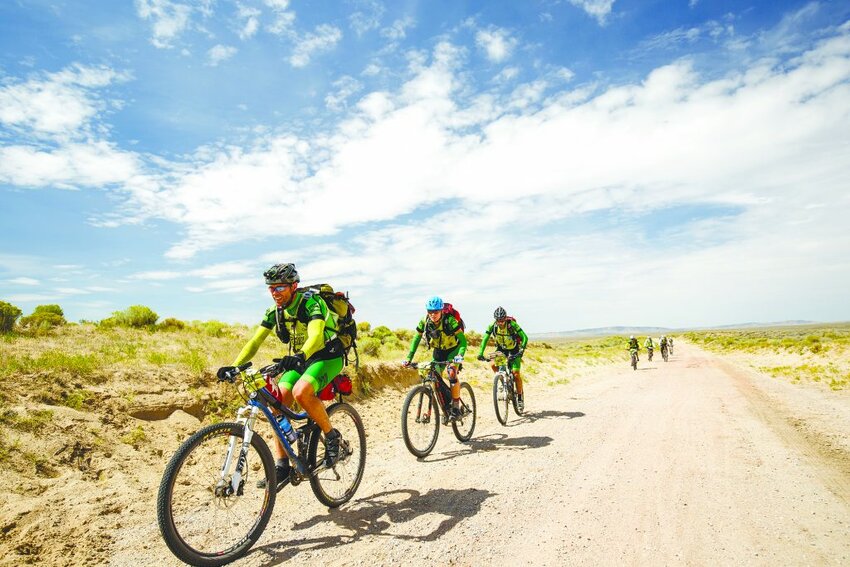 Bellingham’s Quest Race Team during one of the mountain bike legs at the Adventure Race World Championship. Chris Radcliffe photo.[/caption]
Bellingham’s Quest Race Team during one of the mountain bike legs at the Adventure Race World Championship. Chris Radcliffe photo.[/caption] Imagine standing on the outskirts of town. You are contemplating a journey equivalent to 17 back-to-back marathons or more if you get lost along the way. With your trail shoes on, three friends by your side, a svelte pack of essentials and a paper map in your pocket, you wait for the sound of a whistle. When it blows, you head straight for the horizon by foot, bike and paddle in one massive, uninterrupted push until you reach your destination, some five nights and 450 miles later.
Believe it or not, in the niche of ultra-endurance sports, this is actually a “thing” and it is known as expedition adventure racing. In this sport, teams of two to five race from checkpoint to checkpoint, battling terrain, lack of sleep and navigational challenges for days at a time. After years of honing their skills, Bellingham’s Team Quest – Brent and Annie Molsberry, and Emily and Dusty Caseria, two married couples – went this summer to the Adventure Race World Championships in Wyoming.
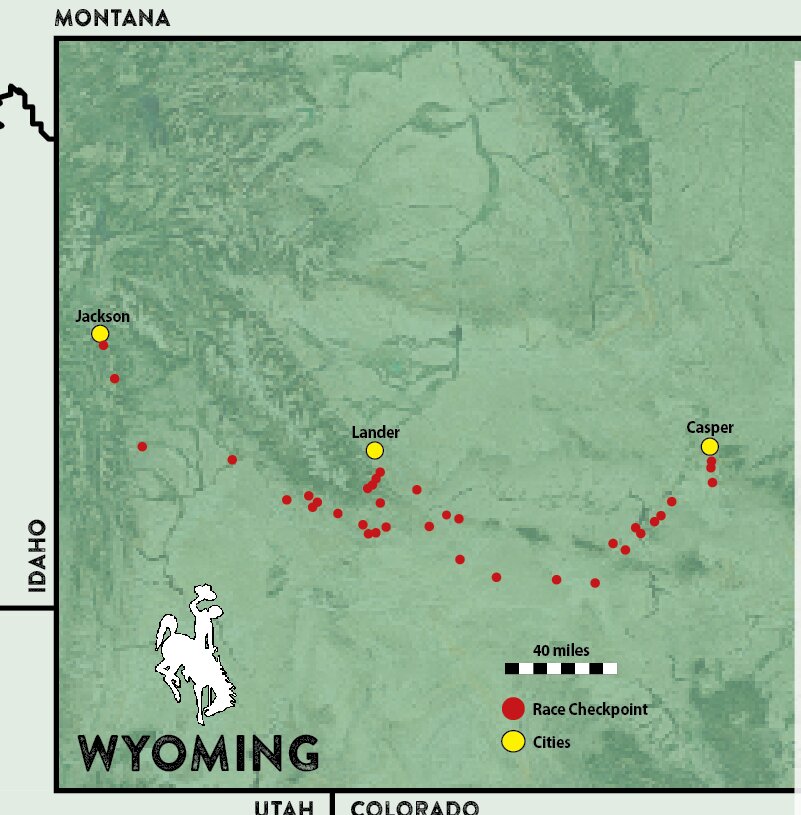 Checkpoints on the Adventure Race World Championship route.
Checkpoints on the Adventure Race World Championship route.Along with 60 of the world’s top teams, Team Quest ran, trekked, mountain biked, paddled and rock climbed from Jackson to Casper, Wyoming, a distance of 460-500 miles depending on route with nearly 100 miles on foot, 300 miles by bike and 60 miles on water. Racers had to pass 12 mandatory checkpoints along the way using only a paper map.
Participating in its first world championship race, Team Quest hoped “to keep moving, not get injured, clear the course, support one another with heart, trust and respect, and not to lose the joy in what we were doing, despite the inevitable discomfort and stress of such a high-level competition,” Annie wrote in a race report. They also wanted to finish in the top half.
After storming out of Jackson alongside 240 other racers, the lowest moment for Team Quest occurred the first night. On paper, it looked like a couple trails could be joined together for a quick start. Instead, at nightfall, the team found itself at the dead end of a trail network – nothing like what the map depicted – in a cold creek drainage dotted with fresh bear scat. In the process of trying to reorient, they spent the first night cold, hungry, exhausted and stressed.
Think of the most ambitious double date you can imagine – that’s a Team Quest training mission.
It was a rough start, but the team trains for that kind of thing. A firefighter/paramedic, a physical therapist-in-training, a registered nurse-in-training, and a mechanical engineer, these Clark Kents spend most of their spare time as adventure racers. At their level, even with full-time work and school, adventure racing is more of a lifestyle than a hobby.
If they seem a bit tired at work on Monday mornings, it might be because they spent the weekend biking from Bellingham Bay to the base of Mt. Baker, climbing to the summit and skiing off the top, then pedaling back to the bay. Or circumnavigating Lake Whatcom on mountain bikes with as much technical trail and steep climbing (and maybe some bushwhacking) as possible.
Think of the most ambitious double date you can imagine – that’s a Team Quest training mission.
Brent, the team captain, began expedition adventure racing in 2004 at the six-day Primal Quest adventure race in northwest Washington. With a team of newbies, he finished 18th against the best in the world. With a newfound love, Brent got involved in promoting the local adventure race scene and today, along with Bellingham-based organization Recreation Northwest, organizes events such as the Kulshan Quest and San Juan Island Quest Adventure Races.
Brent formed the Quest Adventure Race Team in 2013. Dusty and Emily, former competitive college runners, joined in 2014. Annie, a former professional modern dancer and occasional swim-commuter, joined the next year. With Brent’s guidance and encouragement, the four developed their craft for racing, starting with “sprint” races (two to three hours) and eventually moving up to 12, 24, and 36-hour “mid-distance” events. Their names are now common at or near the top of results sheets in local and regional events.
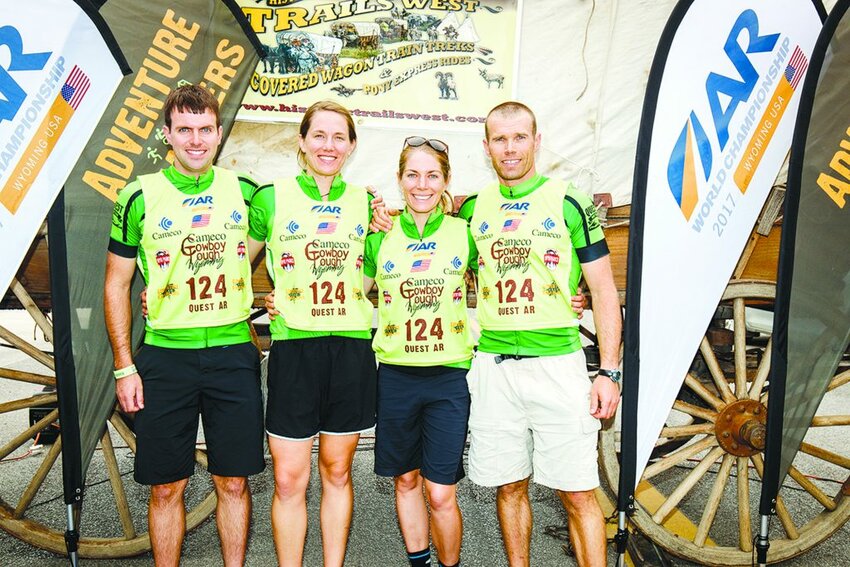 Team Quest, from left: Dusty Caseria, Emily Caseria, Annie Molsberry and Brent Molsberry
Team Quest, from left: Dusty Caseria, Emily Caseria, Annie Molsberry and Brent MolsberryThe team grew close along the way. Emily and Dusty married in 2015, and Brent and Annie married this summer. On the racing front, by late 2016 the quartet had qualified for the World Championships in Wyoming, the pinnacle of the sport.
The team drew on its experience to dig its way out of that mental and physical low-point in the dead-end drainage just outside Jackson. They motored on and a 36-mile bike ride revived their spirits. While the race is called “The Cowboy Tough” by the organizers, it could also be The Cowgirl Tough, as teams must have both genders. Team Quest was one of only three teams racing with two women – most had only one.
“The capacity to endure boils down to communication, mental toughness and perseverance,” Annie pointed out. “Gender is inconsequential when it comes to these critical elements.”
With the first big misstep out of the way early on, the team fell into a better groove and took a less literal view of the map, adopting the motto, “the map is wrong.” As they covered ground, they steadily passed other teams. But the elements did not relent: they endured hot sun, cold, freight-train winds, horizontal rain, sandy mud and clay and ink-black nights, all with very little sleep.
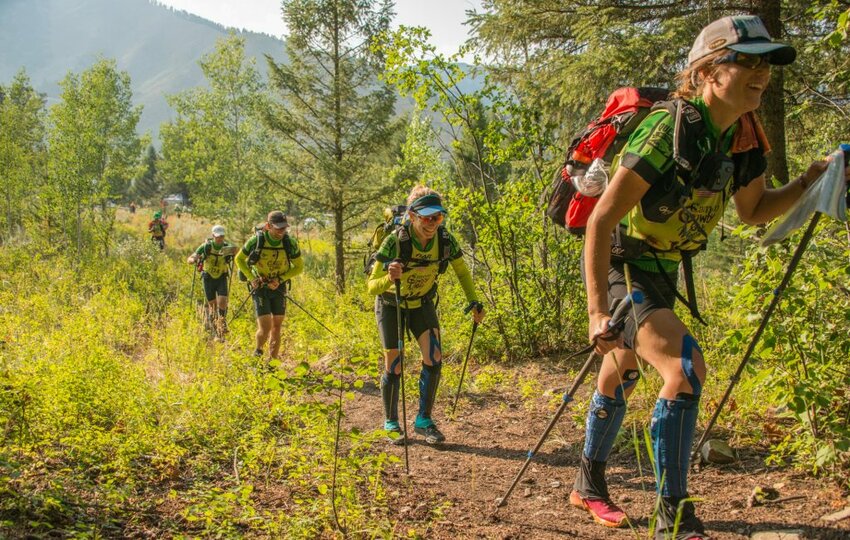 Randy Ericksen photo.
Randy Ericksen photo.They received “morale resuscitation” from encountering other teams. In one instance, they learned of the “bivvy burrito,” where a more experienced team demonstrated how to go from riding bikes to being lined up in a ditch, swaddled all together in a space blanket and snoring. All in less than one minute.
Speaking of sleep, one of the primary challenges of multi-day adventure racing is the lack of time to recharge. The team’s strategies to staying awake include call-and-response singing, repeating one word over and over until thinking of another word to repeat, wiggle dancing, burpees, recounting every detail of falling in love with your partner, 10-minute naps and, finally, slackening all facial muscles and then slapping your face as hard as you can.
Team members fell asleep while riding bikes uphill, downhill and
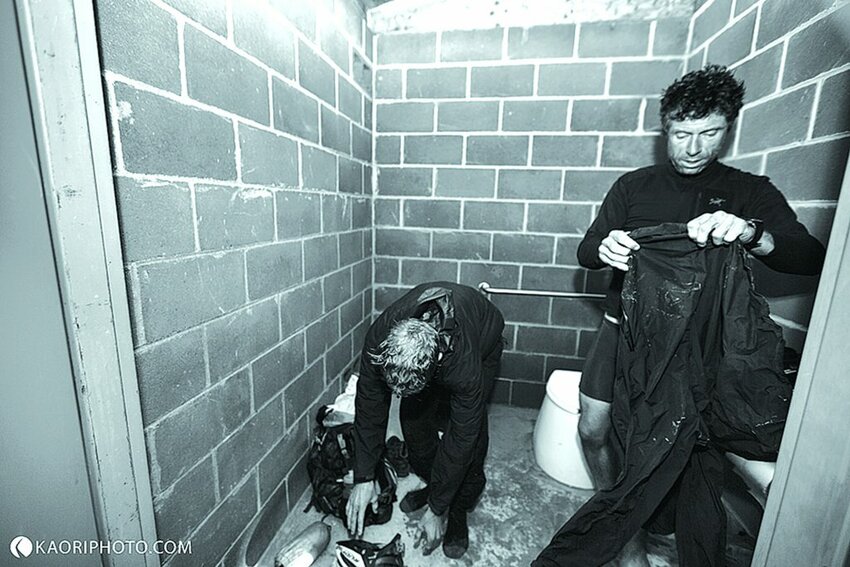 Kaori Funahashi photo.
Kaori Funahashi photo.while paddling a pack raft. By the fifth night, they described themselves as being “a haggard foursome.” That night they napped for “a glorious 80 minutes” inside a structure surrounding a pit-toilet in the barren sage steppe outside Casper.
And all of sudden, there they were, 127.75 hours and hundreds of miles of sagebrush, rattlesnakes, bear, cacti and thunder and lightning later, uninjured, moving swiftly toward the course’s finish and supporting each other with heart, trust and respect. Despite tremendous discomfort, they were overcome with joy and nearly in the top third of the race in 24th place.
They met all of their objectives and then some. They spent 95 percent of the five-and-a-half days on the go, with less than eight hours of cumulative sleep. They lost 27 pounds between the four of them, but they made it.
In the end, the numbers tallied along the way mattered less than the perspective gained from the experience. Many see such pursuits not as a pinnacle of human spirit, but more so the pinnacle of athletic hubris. Choosing to endure five-and-a-half days of the torture that is expedition adventure racing is, in part, an escape from reality. But Team Quest acquired lessons for the real world.
“It is my hope that the challenges I overcome during training and racing strengthen my spiritual endurance and ability to act against the intolerance, injustice and hardship that exists beyond the bubble of sport,” Annie wrote in her race report. “Stepping off the race course, may I meet these challenges with the same goals Team Quest had for our World Championship effort: keep moving, don’t get injured, and support my fellow humans with heart, trust and respect.”
Spencer Paxson is a professional mountain biker and owner of a sports performance coaching business. He is a Northwest native who has traveled the world but loves the mountains of home the most. peakbham.com